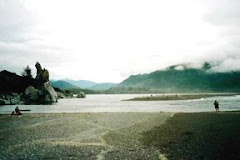This KlamBlog features a report from a first time KlamBlog contributor. Luke Ruediger feels passionately about his home in the Upper Applegate River Valley near the Red Buttes Wilderness and Kangaroo Roadless Areas. But Luke goes beyond emotion. Operator of his own restoration company, Luke has studied the forests of the Klamath Mountains from the bottom up – applying on-the-ground experience and book knowledge – in order to gain a deep understanding.
When fire came to Luke’s “backyard” during the summer of 2012, he was concerned but also curious. Luke learned all he could from fire managers and – once the fire was contained – he ventured into the burned landscape to learn firsthand what the fire had done to the land and vegetation, as well as how the fire was fought, the consequences of the strategies and tactics employed by fire managers.
View of the Goff Fire above Seiad Valley with Klamath River in the foreground.
Here is a link to Luke's Report. It is what I call the “natural history” of the Fort Complex Fires; since people are part of nature, the history of how the fire was fought is part of the story.
Unfortunately, fire histories like the one Luke has written about the Fort Complex are rare. Forest Service managers and firefighters do not like having the strategies and tactics they employed examined. The information that is shared by the Forest Service during a fire is of the public relations type; the details of how the fire was fought are obscured and difficult to obtain. Fire managers do not even map the areas they burn in backfires and burnouts’ making it difficult for anyone to study the manager’s discretionary suppression actions and the natural wildfires as distinct and different. As you will read below, however, wildfires and discretionary suppression fires often behave very differently in these Klamath Mountains and they have different impacts on land, vegetation and water.
Firefighters operating in wilderness and roadless backcountry are supposed to use Minimum Impact Suppression Tactics (MIST) in order to minimize impacts from suppression efforts. Links to several presentations of Minimum Impact Suppression Tactics are provided below. Unfortunately, whether MIST is used or not is a local decision made by the forest supervisor and fire managers. In walking and studying every large fire which has burned in the Klamath Mountains since 1987, I've discovered that MIST was followed only in a few cases.
Typically firefighters have used the same strategies and tactics in wilderness and backcountry that they use where there are roads, homes and communities. But, in spite of many miles of firelines, hot burnouts and massive backfires, firefighters have never successfully suppressed a Klamath Mountains wildfire which was burning in wilderness or roadless backcountry. Since at least 1987 it has always been the coming of fall rain and snow which puts out the big backcountry fires.
Because of the aggressive and destructive manner in which local Forest Service managers and firefighters have chosen to suppress fire in backcountry, I believe discretionary wildfire suppression is - along with livestock grazing - the #1 factor degrading Klamath Mountains wilderness. Furthermore, aggressive wildfire suppression is inconsistent with the stated Forest Service goal of returning fire to a more natural role in the Klamath Mountains.
Portion of the burnout along Portuguese Creek in the Kangaroo Roadless Area
Fire is a major force within the Klamath Mountains and throughout the American West; fire fighting and the impacts to land, water and vegetation that result from fire fighting are major and controversial. The natural histories of these wildfires make it possible for citizens and responsible officials to examine and learn from the wildfires and from efforts to manage and suppress them. Through open examination of fire fighting strategies and tactics at the community, agency, regional and (ultimately) national levels, we can learn how wildfire works and reform our approach to wildfire - including when, were and how we choose to "fight" them.
<<<<<<<>>>>>>>
Follow this link to read Luke Ruediger's history of this year's Fort Complex Fires
Follow the links below to learn about Minimum Impact Suppression Tactics (MIST)
- http://www.wildfirelessons.net/documents/GB_Mist_Guidelines.pdf
- http://archive.org/details/gov.nwcg.nfes.2916
- http://www.nifc.gov/PUBLICATIONS/redbook/2003/AppendixU.pdf
- http://www.wilderness.net/toolboxes/documents/fire/MIST_implementation.PDF
.JPG)




